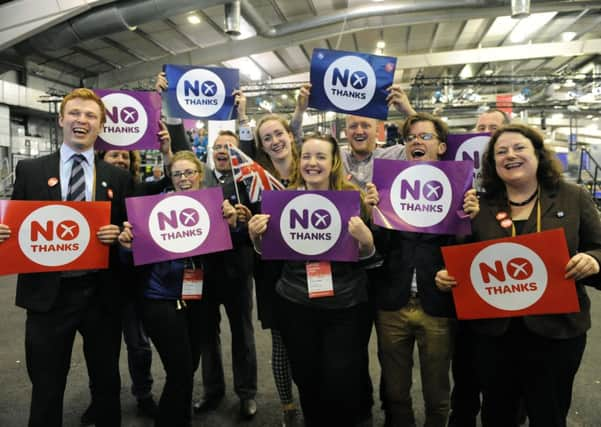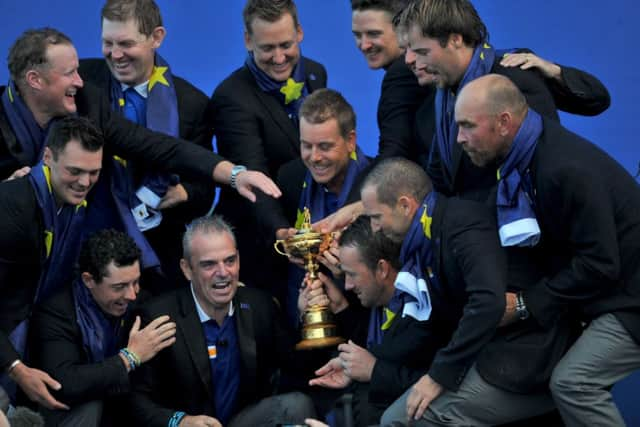Review of 2014: Scotland votes No | Ryder Cup win


NO SINGLE month in Scotland’s history had the potential to so radically alter the nation as September 2014.
On the 18th voters, including for the first time 16-year-olds, were charged with choosing to retain the United Kingdom or grasp the nettle of independence.
Advertisement
Hide AdThe debate was fierce, dogmatic, but would trigger a public engagement with politics previously unseen in Scotland.


The economy remained the key battleground. Danny Alexander, as Chief Secretary to the Treasury, wrote to John Swinney asking that he withdraw what he described as the SNP’s “bogus” threat to “renege” on its share of the UK debt if a currency union was blocked following a Yes vote. Guy Walker, a 61-year-old grandfather from Hampshire, set out on a 447-mile march to Edinburgh in a bid to convince Scots not to break up the Union, while carrying a banner that read: “Scotland United We Stand.” An anonymous gambler who had placed £600,000 on No added a further £200,000 to his wager and stood to win £973,333. The Proclaimers’ pro-independence song Cap in Hand topped the Amazon singles chart.
Jim Murphy returned to the streets on his Irn-Bru crates. He was congratulated for making a giant media omelette out of a single egg, after one was hurled the previous week by a Yes supporter, prompting Murphy to briefly shut down his 100-town tour for “security reasons”.
The winner for selfies was clearly Alex Salmond, who squeezed up close to any voter, young or old, male or female, who wished to get a photograph with the First Minister. The Better Together team insisted Alistair Darling was willing to “hug” if ever he should be asked. GQ named Mr Salmond: “Politician of the Year”. Property experts revealed the sale of a number of homes in Edinburgh included legal clauses allowing the purchaser to rescind in the event of a Yes vote. Charity campaigner and pop star Sir Bob Geldof urged Scots to reject independence, arguing: “Nationalism is a very dangerous political animal. I know this – I’m Irish. It is a cheap political trick which twists the understanding of who we are.”
If the referendum had a tipping point it was Sunday 7 September when the Sunday Times published an opinion poll by You Gov which, for the first time, put the Yes vote ahead at 51 per cent and No at 49 per cent. The poll showed that Better Together’s lead of 22 points had collapsed in just over a month. When Mr Salmond was told the news while playing golf with his nephew, he then played the best shot of the game. The Prime Minister was with the Queen at Balmoral, where their conversation may have been a little more fraught.
In response to the poll, billions were wiped off the market share of Scottish companies and the pound fell to the lowest point against the dollar in ten months.
Advertisement
Hide AdGordon Brown, the former prime minister, who had previously played a minor role with Better Together strode on to centre stage and united the three leaders of Westminster’s political parties into what was framed as “The Vow” which appeared on the front page of the Daily Record in mock medieval parchment as a promise for further enhanced powers to Holyrood. Mr Brown talked of a deal “as near to federalism as you can get…” He insisted draft laws would be in place by Burns Night 2015. Yes campaigners dismissed this as “panic and desperation”.
In a move that each party leader insisted was not motivated by “panic and desperation”, Mr Cameron, Ed Miliband and Nick Clegg all agreed to ditch Question Time and instead fly to Scotland to campaign for the Union. A day later, 60 Labour MPs caught the train north to Glasgow to add their voices to the call. They were greeted by an equally vocal group of Yes campaigners. An attempt to raise the saltire over Downing Street failed when the flagpole rejected it, sending the flag tumbling down into workmen’s faces.
Advertisement
Hide AdThe announcement of a second child for Kate and William was dismissed as a royalist ploy to save the Union by conspiracy-minded nationalists. Nobel Prize-winning economist Paul Krugman said of independence in the New York Times: “Be afraid, be very afraid.”
However, it was staff at BBC Scotland who felt emotions rise when Yes supporters marched on their headquarters in Glasgow to protest at Nick Robinson’s report on RBS’s decision to relocate its headquarters to London in the event of a Yes vote, news of which was leaked to him by the government while the bank’s board was still discussing the matter.
The Scotsman published a front-page editorial arguing that we remained: “Better together”. Scotland on Sunday and the Herald later published similar editorials backing the No campaign, while the Sunday Herald was the only paper to support Yes. The Sun’s publisher, Rupert Murdoch, flew in to Scotland to test the political water with the assumption that the Sun would back Yes. However. after enjoying pints and conversation with voters, the media mogul rowed back and the Sun took a neutral stance.
Four days before the vote, the Queen told wellwishers gathered outside Crathie Kirk that she hoped everyone “would think very carefully about the referendum”. It was later claimed that this was a deliberate attempt by the Palace to rebut Mr Salmond’s remarks that she would be “proud to be Queen of the Scots”. Instead of being kept well back, the local reporter Jim Lawson was, unusually, permitted to get close enough to hear the monarch’s comments.
Mr Miliband, on a final visit to a shopping centre in Edinburgh, was hounded out by Yes supporters. The next day Mr Brown delivered what many described as the finest speech of his political career in defence of the Union, stating: “We built the health service together. We built the welfare state together. We will build the future together.”
THURSDAY, 18 SEPTEMBER The nation – 4,285,323 of whom are registered to vote, which at 97 per cent of the eligible population is the highest number recorded – went to the polls. After insisting he would not comment, tennis star Andy Murray tweeted that the No campaign had forced his forehand and stated: “Huge day for Scotland today! No negativity last few days totally swayed my view on it. excited to see the outcome. lets do this!”.
Advertisement
Hide AdEn route to cast his vote, Mr Salmond said Murray had hit another winner, but within minutes the Wimbledon champion was assailed by Twitter trolls, one of whom wrote: “wish u had been killed at Dunblane, you miserable anti-British hypocritical little git. Your life will be a misery from now.”
Between 7am and 10pm, 85 per cent of the population turned out to vote. There was some trouble, with two people arrested and Police Scotland called in to investigate a matter of electoral fraud after ten people in Glasgow arrived to vote only to discover someone else had used their ballot paper. Nationalist tourists from Corsica, the Basque Country and various communities in France flew in to witness the historic vote.
Advertisement
Hide AdHundreds of Yes campaigners began their celebrations early and took to Glasgow’s George Square brandishing the saltire. But No took the majority in 28 out of 32 local authority areas, with Yes triumphing in Glasgow, Dundee, West Dunbartonshire and North Lanarkshire. The final total was No: 2,001,926 Yes: 1,617,989, a division of 55 per cent to 45 per cent, on a turnout of 85 per cent.
A photograph was taken of Mr Salmond, apparently slumped and dejected, being driven to Aberdeen airport. He later insisted he was merely looking down at his laptop.
Later, as he conceded defeat, the First Minister stated: “Today of all days as we bring Scotland together, let us not dwell on the distance we have fallen short, let us dwell on the distance we have travelled and have confidence the movement is abroad in Scotland that will take this nation forward.”
The next morning Mr Cameron stepped out of 10 Downing Street to state that he would honour the promise of new powers to the Scottish Parliament made during the campaign, but added: “Now the debate has been settled for a generation, or as Alex Salmond has said: ‘Perhaps for a lifetime’. So there can be no disputes, no re-runs; we have heard the will of the Scottish people.”
In what is later viewed as a slight, the Prime Minister went on to insist that new powers for Scotland should be achieved in tandem with “English votes for English laws”.
Within hours, Mr Salmond resigned as First Minister and SNP leader: “For me, as leader, my time is nearly over but for Scotland, the campaign continues and the dream shall never die.”
Advertisement
Hide AdHowever, he stated that the SNP would hold “Westminster’s feet to the flames” in order to ensure that the “The Vow” of extensive new powers was upheld.
In the days following the vote, the SNP enjoyed an extraordinary surge in membership, with almost 75,000 people signing up, making it the third-largest political party in the UK.
Advertisement
Hide AdSuch is the fickle nature of the media that international focus on Scotland quickly switched from the nation’s vote on independence to the progress of a little white ball as Gleneagles hosted the 2014 Ryder Cup. Europe beat America by 16.5 points to 11.5.
For all that, it was an amazing victory, boosting Scotland in the eyes of the world as did the success of the Commonwealth Games in Glasgow.
It was also a personal triumph for the European captain, Paul McGinley.
Emma Watson, the actress, launched a campaign for sexual equality, HeForShe and said: “Men – I would like to take this opportunity to extend your formal invitation. Gender equality is your issue too.”
The House of Commons, recalled early, voted for air strikes in Iraq against IS, which continued to release videos of western hostages being beheaded.
Then, hours after the family of David Haines, a Scottish aid worker, held hostage by Isis appealed for his captors to contact them, a video was released of his brutal beheading.
• TOMORROW: OCTOBER TO DECEMBER